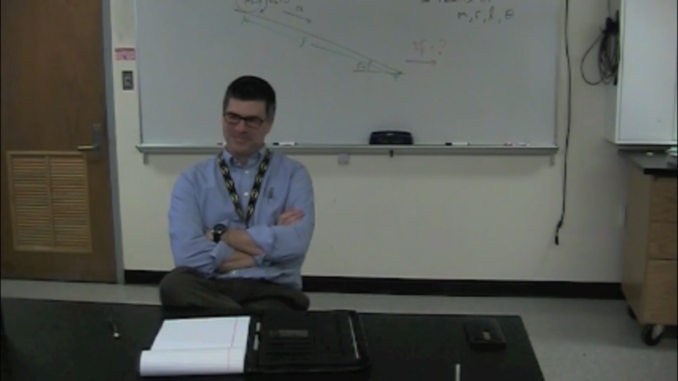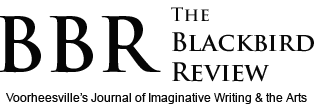
“Imagination is more important than knowledge. For knowledge is limited, whereas imagination embraces the entire world, stimulating progress, giving birth to evolution. It is, strictly speaking, a real factor in scientific research.” Albert Einstein
Mr. Ted Simons, physics teacher and Science Olympiad Coach at Clayton A. Bouton High School, is known for loving science. However, what most students don’t know of is his love for reading and writing. Science fiction is his genre of choice–not surprising because of his background in science. And he often channels his passion for creativity in his writing and in his problem solving. Mr. Simons has created and coordinated two of the most-loved academic events every year: the Fall Fling and the Winter Wave, where Regents Physics students build catapults and boats, respectively, to compete against each other. This is in addition to an AP Physics project that’s completed every year! Mr. Simons is, without a doubt, an intellectually curious man with a great sense of imagination. It’s my pleasure to share with you a little more about his life and his creative endeavours!
How long have you been teaching?
I think it’s eleven years now.
Why did you decide to teach?
It’s a convoluted answer, but the short answer is the fact that I had a daughter. And I started to see how wonderful it was to see another person learn. So that’s the short answer, but there’s lots of other pieces in there. Blame my daughter. It’s her fault. [Laughs].
What do you know now that you wish you had known on your first day as a teacher?
Kids are people, too—that’s the biggest single thing. I was terrified of you guys when I started. Not so much anymore. I can handle adults, but seventeen year olds—sixteen year olds—scared the **** out of me. But I realized we’re all in it together.
Can you tell us about the best teacher you’ve ever had?
That’s hard because I don’t navigate by the “Best Evers”. I’ve had some who were really important to me. I had a crush on my third grade teacher, Ms. Adamson. She called us her “bunky-boos.” I don’t know what that means, but it somehow touched my heart. After that, I worked with a professor at Union College during my grad work; he had the right balance of passion for physics and having fun while doing it. So that was a big piece of it, too.
I’m sure there are others. J. J. Sinchaski, my high school physics teacher. Those are a few that were important, but there were a lot.
Have you ever thought about changing your career?
This is my fourth career. My wife kids me that I can’t keep a job. [Laughs]. I’m not looking to change from teaching. I hope to die in front of my students one day.
Any preferable way?
To die? Quickly—cardiac arrest or just keeling over. I’ll certainly traumatize the twenty or thirty kids in the room at that time, but then there’s no slow decline into the afterlife that I have to worry about. Just get it over with! My wife and daughter will have to clean up the mess, and whoever is principal at the time. It’s the way to go out if you’re a teacher, I think.
What do you think your biggest success as a teacher has been?
Again, you’re asking extrema and that’s not the way my mind works, but I’ll try my best to answer it. One project that I’ll go to my grave—even if it happens as cardiac arrest in front of the class—proud of, is the AP class a couple years ago that launched the balloon and got it up to 115,000 feet and took pictures of the curvature of the Earth. In terms of single events like that. If I back out, one of the things that i like that I do that is just boatloads of fun—puns intended—is the Winter Wave. Voorheesville has a pool, so I was able to add it as a project when I came here. It’s just a fun day—I’m glad that’s in the mix. It’s smaller [than the weather balloon], but it’s a perpetual big deal for me.
Is there a particular genre of literature that you’re drawn to?
I know you know the answer to this, but yes. I read Science Fiction and Fantasy for fun. I have a tough time reading serious scientific texts. They’re just sometimes really boring. My fellow scientists will argue with me on that, and rightfully so, I think. It’s not that I don’t like what I learn, but I’m a big Science Fiction/Fantasy reader.
Do you have a favorite book or series?
I’ve been through the Lord of the Rings eleven full times before the movies came out—sadly, only once since the movies came out. When I was in my late teens there was a scientific fiction writer named Roger Zelazny who wrote something called The Chronicles of Amber, which is just kind of brain candy for teenage boys.
Did you read often growing up?
Frankly, yes I did. In fact, when I was in eighth grade, I was the only student—this is a point of pride for me—that when we had the Scholastic News things, the teacher had to open up a second row for me. She said, “That’s never happened before!” because I ordered so many books. I was a member of the Science Fiction Bookclub when I was in high school and I had shelves of stuff. So, yes, I read a lot.
Do you remember your favorite childhood book?
How old? Give me an age.
Middle school.
The Sword of Shannara by Terry Brooks. I think that would’ve been it. It sort of set me on the path of Fantasy reading.
Do you think your interest in science stemmed from reading those kinds of books or did it happen at the same time?
I suspect they evolved together. I do very much like the way things work. It fascinates me. And then, if you can extrapolate from the way things work into what could be, that becomes Science Fiction. So they evolved together, I think. And Fantasy is just good fun—it doesn’t have to be possible. Who wouldn’t want to be a wizard?
Did you like English class in high school?
Yes, very much.
Did you continue to take any literature or writing classes in college?
I took a couple. I remember one creative writing class, I loved that to pieces. The problem was it conflicted with my hardcore courses, so it didn’t get the attention it deserved. There was an obligatory expository writing in my first year. That was just agony. Oh—and this was technically a history course—I took History of Science Fiction as a college course. During the summer, we’d show up in shorts and t-shirts and talk about the books we had read the night before—which I would’ve done anyway. And then after that we’d go out and play frisbee or softball. It was a good time.
Have you ever tried writing?
Yes. I do write, I enjoy writing. I have yet to publish.
Do you write novels, or poetry . . . ?
A personal problem I have is finishing what I start. I have started many things that could be novels. I’ve written short stories, too. I’ve never finished a novel-length anything, but I’d like to because I think a story of that magnitude is worthy. Short stories are nice, but they have to be so well crafted to get through it. And I enjoy doing that for the challenge, but I like the more luxurious pace a novel can offer. But I haven’t finished. Current title? Solitude and Whisper. That’s something I’m writing right now. Watch for it! [Laughs].
As a physics, I imagine you’ve built quite a few things. Which project was your favorite?
I’ll tell you something I enjoy building for others. I’ve built lots of things, and I enjoy it because it’s like doing a puzzle. You like it when it’s there, so to pick what’s maybe the best, I don’t really know. I do recall the AP Physics class a few years ago—they wanted to capture a squirrel that was running around the courtyard. They were going to build a robot to capture said squirrel. The good news is they were too hapless—they were never going to get a robot of that magnitude. Nor would the ASPCA allow us to capture squirrels out there. So I built a robotic squirrel for them to chase around. With great delight, it ran circles around their chase vehicles and they didn’t stand a chance of catching it. I eventually shut it off and they tried to capture it with only limited success. That was a fun project. I got to build a little robot that ran away.
Do you think that your interest in writing and reading has influenced the way you solve problems or approach projects?
I haven’t considered it before. I’d like to think so because when you solve a problem, you have to understand the point you want to get to. And that involves poking at things a little bit. You try this, it doesn’t work, so you back up and try again.
I sort of know the story I want to tell, but I’m not sure how to get from the beginning to the end all the time. So I’ll write these little pieces that eventually weave together. I try to keep most of them. I was crafting stories—at least, in my head—before problem solving. It’s tough to say which came first—the chicken or the egg. But they evolved similarly and there are a lot of comparisons. I hadn’t considered it until you just suggested it, so I’m glad you did.
Those are all the questions I have. Is there anything else you would like to say?
Mr. Stumbaugh, who you know and you’re under his guidance to be here today, and I created a class called Modern Civilization where the students were supposed to develop and grow a civilization that moved through time. That allowed me to do little bits of writing in and around the school day that were attached to this larger project. It allowed me to write a little bit regularly, and I don’t do enough of that. It helped me rediscover that I still hope I can be writer. I don’t know if I ever will, or have the stuff needed. But I’d like to think that as the crush of daily school slows down—if I don’t go into cardiac arrest in front of my students—I’d like to discover that. [Modern Civilization] let me know that I can write while I do other stuff.
